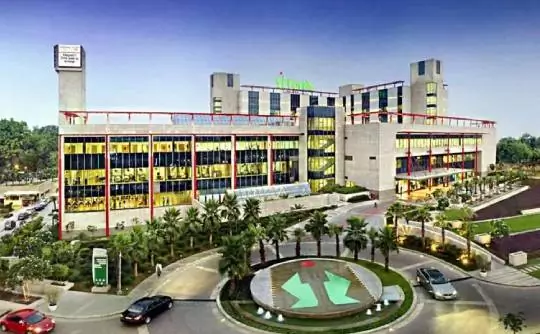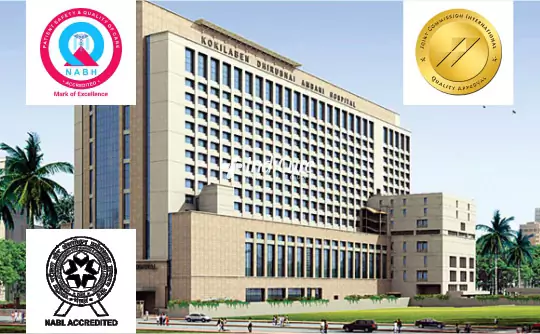

Nuclear medicine is a branch of medicine that involves the diagnostic and therapeutic use of radioactive materials (radiopharmaceuticals). Nuclear medicine imaging is used to study the structure and function of internal organs and to assist in the early detection of anomalies or cancers. Certain types of cancer and disorders are also treated with this discipline of medicine. Nuclear medicine examinations are painless and safe. They make it possible to diagnose a wide range of ailments and diseases quickly and accurately.

We Help you Choose the Right Treatment, Surgeon & Hospital

We Arrange Video/Telephonic Consultation with the Surgeon

We Assist you with Visa & Accommodation

We Receive you at the Airport and Drop you at Hotel/Hospital

We Assist you the at Hospital & Provide Post Operative Support
In fact, we have Special Negotiated Rates with the Hospitals and you can avail Discounted Rates when you choose to Travel with IndiCure.

A small amount of radioactive materials is employed in diagnostic procedures to help in viewing the organs, allowing the doctor to discover and identify the abnormalities, size of any tumors, and other physiological or functional problems with the organ.
This approach can also be used to track the course of the disease and its response to treatment. The treatment involves injecting radiopharmaceutical substances into the patients and imaging with PET (Positron Emission Tomography) or SPECT (Single Photon Emission Computed Tomography) cameras. The emission spectra produced by the radiopharmaceutical substances utilized can be read using these approaches.
Nuclear Medicine offers applications in a wide range of diseases, with a focus on Oncology, Cardiology, Nephrology, Orthopedics, Rheumatology, and Neuropsychiatry in particular.
Physicians employ nuclear medicine imaging procedures to visualize the function of an organ, tissue, bone, or system in the body.
Nuclear medicine can also be used to treat numerous types of disorders that involve a modest amount of radioactive material. Patients with Thyroid Cancers or an overactive thyroid gland, Neuroendocrine Tumors, Prostate Cancers, Lymphomas, and Liver Tumors are frequently provided nuclear medicine as a therapeutic option.
This targeted therapy strategy damages cancer cells with a little amount of radioactive material or radioisotope, known as Radiopharmaceutical. To deposit fatal radiation into the tumor, the radioactive chemical is conjugated with a tumor-targeting agent. It comes in the shape of a drink, an injection, or a capsule.
Nuclear Medicine Therapy is a relatively new specialty of medicine that combines precision therapeutic strategies with molecular imaging tools. It uses molecular diagnostic tools to diagnose the condition and then uses the same technology to give a radiation dose to the affected area (abnormal tissues).
It is based on the concept of "Theranostics," a ground-breaking field that focuses on giving each patient the correct medicine at the right time and in the right amount.
Iodine-131 therapy for an overactive thyroid gland and thyroid cancer, PRRT for neuroendocrine tumors, and PSMA therapy for prostate cancer are all examples of this method.
Radiation from radioactive material has a greater impact on cancer cells and other illness cells than on normal cells. The radiopharmaceutical chemical has the potential to destroy cancer cells or shrink tumors in the long run.
A naturally occurring or man-made compound that emits radiation energy is known as radioactive material. The radioactive substance or radiopharmaceutical molecule can be utilized to kill cancer cells or slow the progression of the disease. The material can be solid, liquid, or gas, and it can be given to target cells in a variety of ways depending on the part of the body.
For example, radon is a gas that can be inhaled for therapy, but radioiodine comes in the shape of a capsule or liquid that must be eaten. Every radioisotope has a half-life that defines when it will no longer be radioactive.
The patient is positioned on an examination table, and the dose of radiotracer is given intravenously, ingested, or inhaled as a gas, depending on the type of Nuclear Medicine Exam. The radiotracer can take anywhere from a few seconds to many days to move through the body and collect in the organ or location being investigated. As a result, imaging can be done right away, a few hours later, or even several days after the radioactive material has been received.
When it's time for imaging, the camera or scanner will capture a series of photos by rotating around the patient's body or staying in one position with the patient changing postures in between.
The patient is urged to remain immobile for short periods of time while the camera takes photographs. To capture the greatest quality photographs, the camera may come very close to the body in some circumstances. If a patient is claustrophobic, the technician should be informed before the examination begins.
Nuclear Medicine Procedures take a different amount of time depending on the type of exam. The scanning process can take anywhere from 20 minutes to several hours, and in rare situations, it may take many days.
Nuclear Medicine in India has evolved dramatically in the last few years and is now at par with the best in the world. We have on our panel Nuclear Oncology Experts who are a committed group of Nuclear Medicine Physicians, Dosimetrists, Radiation Oncologists, and Technicians with vast experience in Nuclear Medicine Diagnostics and Therapies.
The regimens and protocols are up to worldwide standards, thanks to internationally qualified professionals and world-class facilities. All cases presented to the team are first discussed in a multidisciplinary board composed of Medical, Radiation, and Surgical Oncologists, Pathologists, Physiologists, and Radiologists.
These Nuclear Medicine centers have the most modern Time of Flight PET CT, which has the best tiny lesion detection and accuracy in the industry. The machine's Time of Flight technology enables it to detect lesions as small as 2mm. The machine also has an award-winning open design that makes the scan painless for claustrophobic patients. The newest reconstruction techniques allow scans to be done nearly twice as quickly as the other devices while exposing patients to far less radiation.
These centers also offers the more complex Ga68 DOTANOC PET CT scans for imaging Neuroendocrine Tumors and APUDOMAs, Ga68 PSMA Scan for detecting Prostate Cancer, and Ga 68 Exendin Scan for Insulinomas and Nesedioblastomas, in addition to the traditional F18 FDG PET CT scans. They also have the facility to do PET CT Guided Biopsies and Interventional Procedures, Radiation therapy planning based on PET CT scans, including 4D PET CT scans.
Gamma Camera - These centers also have the most advanced Twin Head Gamma Camera, which is one of the most versatile dual head gamma cameras in the world. The system is capable of conducting all nuclear medicine operations with improved patient convenience and comfort, as it allows for a variety of detector movements and protocols.
All normal Nuclear Medicine procedures are performed in this section, including Bone Scans, Renal Scans, Stress Myocardial Perfusion Scans, Parathyroid Scans, Brain SPECTS, Ventilation Perfusion Scans, Venographies, and Lymphangiography, among others. Besides, in-vitro tests such as plasma GFR evaluation, labeled leukocyte scanning, and Trodat Imaging, which is not available in many centers in Asia.
Radioiodine Probe: Our panel of Nuclear Medicine centers also offer radioiodine Uptake Probe that is utilized for Iodine Studies.
Nuclear Medicine Therapy Unit: A variety of radioisotope therapies are performed, such as Iodine therapy for thyroid cancer, Lutetium PSMA therapy, and Lutetium based therapies for Neuroendocrine Tumors. Besides, myeloablative MIBG therapy for children with high-risk neuroblastomas, Targeted alpha therapy for neuroendocrine tumors, prostate cancer, and some brain tumors are also available.
We at IndiCure completely understand your concerns and it is always our endeavor to provide the best outcome for every patient. Following is the list of questions you must ask before you embark on your journey for Nuclear Medicine Therapy in India.
Prepare to answer questions about your:


Gurgaon
Fortis Memorial Research Institute (FMRI), the flagship hospital of Fortis Healthcare, is a multi-specialty, quaternary care hospital and is counted among the best hospitals in India and the world. The hospital is considered as "Mecca of Healthcare" and a referral hospital, not only in the entire Asia Pacific but much beyond.

Mumbai
Kokilaben Dhirubhai Ambani Hospital is one of the most advanced and modern hospitals in India. It is a state-of-the-art tertiary care multi-specialty hospital located in the biggest suburb of Mumbai- Andheri. The hospital was launched by Reliance Group in 2008.
The majority of nuclear medicine imaging methods are non-invasive. With the exception of some scans that require an intravenous injection, these scans are normally painless. The radiopharmaceuticals or radiotracers employed in these scans build up in the area being investigated and generate energy in the form of gamma rays or positrons. A unique camera detects them and produces images as well as molecular information.
Doctors can superimpose nuclear medicine images with Computed Tomography (CT) or Magnetic Resonance Imaging (MRI) images to create customized perspectives that provide more precise information and accurate diagnoses when needed.
Traditional Imaging Systems, such as CT (Computed Tomography) Scan, MRI (Magnetic Resonance Imaging) Scan, and others, show only the anatomy or structure of the tissue or organ being investigated, whereas Nuclear Imaging Techniques show the physiological function of the tissue or organ being investigated.
While a limited amount of radiation is utilized and it mostly helps the patient, it does not affect others. As a result, the patient will need to take some precautions to ensure that the radiation does not harm others.
However, It is critical that you inform your doctor and the nuclear medicine service team if you are pregnant, think you might be pregnant, or are breastfeeding before receiving the therapeutic dose. Many nuclear medicine procedures necessitate a pregnancy test within 24 hours of treatment for all women of childbearing age. After some types of therapy, the patient must ensure that she does not become pregnant for at least six months.
After nuclear medicine therapy, there may be some side effects, but they are usually small. Our Nuclear Medicine Specialist will go through all of the possible side effects and consequences in detail. The doctor will also discuss how you might minimize or eliminate negative effects.
The length of time spent in the hospital is determined on the type of nuclear medicine therapy used and the ailment being treated. The majority of therapies are offered as outpatient services, so you may not need to stay in the hospital. Certain types of therapy may necessitate a two- or three-day stay in the hospital. This is to ensure that the patient's radioactivity is reduced to a safe level before they leave the hospital.
Enhance your medical journey to India by availing these extra services.
Traveling abroad for medical reasons may be challenging. With our experience of over a decade and working with the best surgeons and top hospitals in India, we help make your medical tour easier and safer for you. We will guide you at every step of the way and make end-to-end arrangements for your surgery, travel, and stay.
Ramandeep Dhaliwal
I had great experience having rhinoplasty through Indicure. Dr. Ruchika from Indicure has helped me in finding best plastic surgeon, answering all my questions...
Read More
Joshua Archer
My name is Joshua Archer I'm from New Zealand, bay of plenty, kawerau I opted for the bypass surgery in January 2023 but planned it in advance for 28 September found IndiCure...
Read More
Kera Ren
Absolutely loved my experience with IndiCure - from first inquiring to meeting the surgeon pre op to my follow up post op. The surgeon was extremely approachable...
Read More
Andreana Paul
Had a wonderful experience. Visited India for my plastic surgery. From sending mails, airport pickup, comfortable accommodation and, to smooth hospital appointment booking...
Read More
Brandi Luce
I had the privilege of using Indicure's services for a cosmetic procedure that I had wanted for a long time but had always been apprehensive about. Ruchika helped me...
Read More
Jade M
Indicure Health Tours went above and beyond my expectations. They helped me with every aspect of my journey and were professional, kind and caring. I was...
Read More
The content on the website (www.indicure.com) is intended to be general information and is provided only as a service. All photographs on our website of before and after results are examples only, and do not constitute an implied or any other kind of certainty for the result of surgery.
Learn about IndiCure Health Tours' comprehensive editorial policy that strives to deliver trustworthy, helpful, relevant, accurate and people-first content on medical tourism in India.
It is not medical advice and should not be taken as medical advice. It should not be used to diagnose or treat a health condition and is in no way meant to be a substitute for professional medical care. You are advised to see a surgeon in person to assess what surgery may or may not accomplish for you.
It is also important to keep your expectations realistic and to understand that all surgical procedures carry risks and should never be taken lightly.